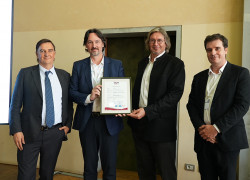The 18th edition of “Banking Day” puts spotlight on the transformation of the banking sector
Organised by PwC Luxembourg on 22 March 2019, this year’s Banking Day was about business sustainability.
In the context of the various forces that are currently shaping the world and putting pressure on financial services, Luxembourg banks want to move from cost-cutting trend to keep performance levels to an agenda focused on productivity. This translates into streamlining processes to attracting and retaining talent, acquiring technology needed to boost productivity, and to become resilient, agile, customer-centric and digitally savvy.
Luxembourg Banking: Live long and prosper?
The theme of this year’s Banking Day, “Live long and prosper”, addressed the reality of the past few years and the transformation that is occurring across the banking sector. The Luxembourgish business environment has entered a transition phase. New market players and the digital wave are forcing banks to rethink their strategies and digitise in order to respond to consumer expectations and defend market share against an increasing array of innovative and potentially disruptive competitors.
Participants enjoyed an agenda of top-level insight on the recent changes and those still to come.
Following the welcome note by Roxane Haas, Banking Leader at PwC Luxembourg, Claude Marx CSSF Director General, spoke on supervisory and regulatory developments in the banking sector. He noted that, “The future is sustainable finance. I invite banks to think of sustainability as a business strategy and, therefore, the need to find new income streams and business models. The banking system needs a homeopathic medicine rather than a chemical medicine, a solution that embraces a holistic, natural approach to the challenges it faces.”
One of the highlights of the day was a debate between the CEOs of two major players of the banking industry, Frank Krings, CEO, Deutsche Bank Luxembourg, and Matthias Kröner, Founder and CEO, Fidor Bank AG. The debate saw Krings and Kröner confront their views and discuss the future of the banking industry.
Competitiveness and the new (banking) world order
The keynote speaker at this year’s event was, Stéphane Garelli, Professor Emeritus at IMD Business School and the University of Lausanne and author of “Top Class Competitors – How Nations, Firms and Individuals Succeed in the New World of Competitiveness.”
According to him, to remain competitive, banks, and companies in general, will need to respond to the needs of the youth, whether they are clients, investors or the future workforce. He said, “Think of who will be banks’ competitors tomorrow, and where they are coming from. Who owns the technology highway, builds exits elsewhere to diversify using the power of data”. The generation of “me-ism” may like to take selfies, but it’s very concerned about the state of the world. They have a particular sense of entitlement and a weird relation with ownership”.
Jurassic Banking: towards extinction or evolution?
Talk of competitiveness, and how to achieve it, paved the way for the central debate of the Banking Day, “Jurassic Banking: towards extinction or evolution?” with Frank Krings - CEO, Deutsche Bank Luxembourg on one side and Matthias Kröner - Founder and CEO, Fidor Bank AG, Germany on the other.
While to Krings, the banks that will survive would have navigated the digital wave by evolving and adapting, Kröner thinks that in future, banks as we know them today would probably do not exist. According to him, “Banks have to decide if they go digital or die.”
In offering the Government’s view with an update on the latest developments in the banking industry, Pierre Gramegna, Luxembourg’s Minister of Finance, said, “Are banks becoming extinct? Banking services won’t become extinct. Newcomers will deliver comparable services; what will change is the way things are done. The key is the consumer and data about the consumer to shape experiences. Regulation is a pendulum that will continue, sometimes more, sometimes less. However, it might be an opportunity. While it can lead to ”uncompetitiveness”, it can make banks more competitive too. That’s why smart regulation is necessary, to make Europe stronger. Brexit will go, but digitalisation will stay.”
As a conclusion, Roxane Haas added “A variety of forces have put pressure on the financial services industry in recent years at global levels. They, including banks, have focused on reducing expenses and personnel, automating, offshoring and introducing new technology. In Luxembourg, several banking players have undertaken transformation initiatives at different degrees; however, we see as necessary to take a step forward to focus on a productivity agenda, and streamline processes. It includes, among others, a commitment to understand better the workforce, bet on improving their digital IQ and mastering digital labour.”
Communiqués liés
A Europe First: PwC Luxembourg achieves European Data Protec...
PwC Luxembourg is delighted to announce it has achieved the European Data Protec...
PwC Luxembourg welcomes New Head of Human Resources, Delphin...
PwC Luxembourg is delighted to welcome its new Head of Human Resources, Delphine...
Emerging Trends in Real Estate®: Europe 2024
According to the latest Emerging Trends in Real Estate® Europe report from PwC ...
PwC Luxembourg: Best ESG (Environmental, Social and Governan...
The CFI.co judges have conferred on PwC Luxembourg the 2023 award for Best ESG (...
New Managing Partner and the Country Leadership Team for PwC...
It is with great pleasure that PwC Luxembourg announces that François Mousel as...
Use of Data Analytics and Artificial Intelligence in Luxembo...
PwC Luxembourg has just released the results of its survey: “Use of Data Analy...
Il n'y a aucun résultat pour votre recherche







